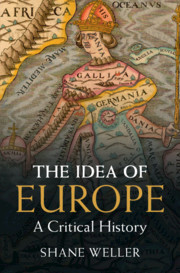Book contents
- The Idea of Europe
- The Idea of Europe
- Copyright page
- Contents
- Acknowledgments
- Introduction
- Chapter 1 Myths of Europa: From Classical Antiquity to the Enlightenment
- Chapter 2 A Great Republic of Cultivated Minds: 1712–1815
- Chapter 3 Nationalism and Universalism: 1815–1848
- Chapter 4 The Russia Question
- Chapter 5 Homo Europaeus: 1848–1918
- Chapter 6 The European Spirit: 1918–1933
- Chapter 7 A New European Order: 1933–1945
- Chapter 8 Unity in Diversity: 1945–1989
- Chapter 9 Other Europes
- Chapter 10 Europe against Itself: 1989 to the Present Day
- Conclusion Good Europeans?
- Notes
- Bibliography
- Index
Chapter 5 - Homo Europaeus: 1848–1918
Published online by Cambridge University Press: 14 May 2021
- The Idea of Europe
- The Idea of Europe
- Copyright page
- Contents
- Acknowledgments
- Introduction
- Chapter 1 Myths of Europa: From Classical Antiquity to the Enlightenment
- Chapter 2 A Great Republic of Cultivated Minds: 1712–1815
- Chapter 3 Nationalism and Universalism: 1815–1848
- Chapter 4 The Russia Question
- Chapter 5 Homo Europaeus: 1848–1918
- Chapter 6 The European Spirit: 1918–1933
- Chapter 7 A New European Order: 1933–1945
- Chapter 8 Unity in Diversity: 1945–1989
- Chapter 9 Other Europes
- Chapter 10 Europe against Itself: 1989 to the Present Day
- Conclusion Good Europeans?
- Notes
- Bibliography
- Index
Summary
Following the revolutions across Europe in 1848, nationalist conceptions of Europe became increasingly dominant, culminating in the founding of the new nation states of Italy (1861) and Germany (1871). The period also saw an intensification of European colonialism, culminating in the “scramble for Africa” towards the end of the nineteenth century. European nationalism and colonialism were increasingly shaped by an ethnological idea of the European, with racial theories of Homo Europaeus justifying colonial barbarism (as exposed by Joseph Conrad at the end of the century). Alongside this particularly dark period in the history of the idea of Europe, Chapter 5 also considers the work of those who sought to champion a cosmopolitan idea of Europe, including Victor Hugo’s calls for a United States of Europe and Friedrich Nietzsche’s notion of the “good European,” most fully embodied for Nietzsche by Western Europe’s Jewish population. As this chapter reveals, however, Hugo’s idea of Europe was profoundly Francocentric, while Nietzsche’s incorporated deeply disturbing elements of the emerging race theory. The chapter concludes with an assessment of growing sense of European decadence at the end of the century, as articulated by writers such as Max Nordau and Georges Sorel.
Keywords
- Type
- Chapter
- Information
- The Idea of EuropeA Critical History, pp. 114 - 140Publisher: Cambridge University PressPrint publication year: 2021



